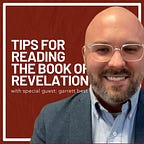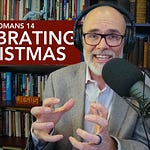Do you struggle to understand the book of Revelation? This episode of the Radically Christian Bible Study Podcast addresses the common problems and misconceptions that people have when reading the book of Revelation. Many find it to be a confusing and scary book of the Bible. However, today’s guest, Garrett Best, explains that Revelation doesn’t have to be scary and that it is actually a highly relevant and encouraging book for Christians today.
The discussion delves into the importance of understanding the genre and context of Revelation in order to properly interpret its symbolism and message. Key biblical concepts explored include Revelation’s role as prophecy, its connection to the Old Testament, and its central themes of exclusive allegiance to God and faithful witness in the face of cultural pressure and conflict. The episode aims to equip listeners with a framework for reading Revelation that focuses on its original purpose and application.
Garrett Best is an associate professor and chair of the Department of Bible and Ministry at York University in Nebraska. He initially avoided studying the book of Revelation, but was eventually drawn to it and ended up writing his dissertation on the book. Best shares his journey of coming to appreciate and champion the relevance of Revelation for the church today, providing valuable insights for listeners seeking to better understand this crucial but often misunderstood biblical text.
Links and Resources
Note: Some links may be affiliate links. Meaning, if you choose to buy something through these links, we receive a small commission at no extra cost to you.
Transcript (Credit: Beth Tabor)
The book of Revelation doesn’t have to be scary. My guest today will help you see how encouraging and relevant this book is for your life. My guest is Garrett Best, associate professor and chair of the Department of Bible and Ministry at York University in Nebraska. This is a deep and rich conversation about Revelation. I know you’re going to enjoy it.
But before we get to that, I want to read from Revelation 22 that says, “Then the angel showed me the river of the water of life, bright as crystal, flowing from the throne of God and of the Lamb through the middle of the street of the city; also, on either side of the river, the tree of life with its twelve kinds of fruit, yielding its fruit each month. The leaves of the tree were for the healing of the nations. No longer will there be anything accursed, but the throne of God and of the Lamb will be in it, and his servants will worship him. They will see his face, and his name will be on their foreheads. And night will be no more. They will need no light of lamp or sun, for the Lord God will be their light, and they will reign forever and ever.”
I hope that this conversation is encouraging to you and, as always, I hope it helps all of us learn to love like Jesus.
WES: Garrett Best, welcome to the podcast, Brother.
GARRETT: Thank you so much.
WES: Well, thanks for being here. I am incredibly excited about having you on the podcast for the first time, but also just talking about Revelation. This is one of those books that it either fascinates people or horrifies people, and maybe somewhere in between. Before we really even jump into it, why don’t you tell us how you got interested in a book like Revelation.
GARRETT: Yeah. So I, like any good Christian, spent my whole life avoiding it, which I feel like that’s what you’re supposed to do, right? And so I was ‑‑ I’m trying to think back. I mean, as I was growing up in church, if we talked about anything from Revelation, it was the seven letters to the seven churches from chapters 2 or 3, but any of the other stuff, we just didn’t know what to do with, and so I don’t remember ever having a class on it or having anything in church about the book of Revelation.
So I did a Bible major, an undergrad, and never took a class in Revelation; I went and did a Masters of Divinity at another institution and never took a class on Revelation, and so I managed to get all of these degrees and never read the book. And then I get to a PhD program where I intended to study the Gospels and maybe Acts, and there was a particular professor that I already knew I wanted to have on my dissertation committee, so I was kind of forced to take whatever was being offered. And so I go to register for classes one semester, and the only course that was ‑‑ New Testament course that was being offered was Revelation, and I thought, you have got to be kidding me. And this professor ‑‑ you would probably know the name, Craig Keener ‑‑ has written a commentary on the book of Revelation and is the most brilliant scholar, I think, out there ‑‑ or at least one of them. And so I was so nervous, and so I was thrown into the fire to have to, like, make up for a lifetime of avoiding Revelation in that class, and so I had to figure out something to write on. Like I had to ‑‑ we had to write a paper for the class, so I ended up choosing a topic. I wrote the paper, and when the professor came to hand the papers back to us, he said, “All of you did great. You did fine, got good grades, but there’s two of you that I wrote on your paper you’ve got to keep going with this.” And I get my paper back, and it says, “You’ve got to keep going with this,” and I said, you’ve got to be kidding me. Like I can’t get away from this book, you know?
And so that ended up leading to writing my dissertation on the book of Revelation, and now I have been converted and I’m a believer. I really do believe that this is the book that we need for, like, our cultural moment right now. And right after I took my exams, the pandemic hit, and we had people at our church, you know, saying wearing a mask is the mark of the beast and these sorts of things, and so it just became very real for me. And God works in mysterious ways, and I’ve just seen how leading me to Revelation was kind of one of those mysterious ways he’s worked in my life.
WES: Yeah. I love how it finally caught up to you but you’re glad that it did.
GARRETT: Absolutely.
WES: Let me ask this: What is it about Revelation that makes it so mysterious, seemingly inaccessible, that people want to avoid it and don’t want to dig into it? What is it about the particular type of literature or the way that it’s written that makes it difficult for Christians to read?
GARRETT: Sure. I have to tell you something that a good friend of mine, John Young, shared with me once. He said, “If anyone ever comes up to you at church and says that they really want to teach the book of Revelation, never let them teach the book of Revelation,” because, for some reason, this book really
gives us two kind of opposite responses. On the one hand, we just avoid it because we don’t know what to do with it; but on the other hand, I think another reason we stay away from it is it’s attracted a certain type of person to this book who comes in and actually thinks they know everything about it and has all these secrets that they’ll reveal to you about what’s going to happen in the upcoming election and what the conflict with Israel and Gaza means, you know, and how it’s related to the book of Revelation.
And so we see these, like, really polar opposite ‑‑ just extreme avoidance or just overwhelming interest ‑‑ and we kind of just ‑‑ it’s just easier not to talk about it. I think there’s a couple reasons for that. One is that when we talk about Revelation, we’re talking about a particular genre of literature, and, actually, the genre that we call it is ‑‑ we call it apocalypsis, or an apocalyptic work. And the name of that whole category of literature actually comes from Revelation 1:1, the apocalypsis of Jesus Christ, the revelation, the revealing of Jesus Christ.
And genre is so important for interpreting a work, anything. So right now my son and I are reading The Hobbit at night together, and if I start a work and it says, “Once upon a time,” I’m not going to leave that reading and go worry that there’s really, like, dragons out there. And it’s that phrase, “once upon a time,” that tells me I’m engaging in fiction here. If we watch a fiction movie in the same way that we do a documentary, then we’re going to be really lost and really confused and really scared, actually.
And so genre is so important when we’re interpreting something, and when it comes to Revelation, it’s actually a genre that we don’t encounter. We don’t see very many apocalyptic texts because, outside of the book of Revelation, at least in our Bibles, there’s only one other section, it’s the second half of Daniel, so Daniel 7‑12, that we would call apocalyptic. And then there are a few subsections, like Isaiah 24‑27 is called the little apocalypse, and you have Zechariah 12‑14 and Joel 3, so you have these minor sections here and there. But even in the book of Daniel, like if you were to ask your audience, they probably know quite a bit about the three young men in the furnace and Daniel in the lion’s den, but once we get to 7 through 12, that section’s like ‑‑ stay away from that; it’s a different kind of thing.
But what I like to tell people is about 200 years on either side of the book of Revelation, so from about 200 BC to 200 AD, we have about 37 apocalypses that have survived, so the Jews knew how to read this. They had apocalypses: First Enoch, Second Enoch, Second Baruch, Fourth Ezra, Apocalypse of Abraham. Christians loved apocalyptic texts, as well. In fact, one of the earliest literatures that Christians love that is not in the New Testament is The Shepherd of Hermas, which is an apocalyptic text. And so Christians and Jews, around the time of the writing of Revelation, knew how to read this genre, and we just don’t, and that is one of the reasons that we, I think, have a hard time with it, which is why we need nerdy people to come in and read those other apocalypses and see how they work and figure out kind of how this genre works so it will help us understand and interpret the book of Revelation. So that’s one reason I would say. And then, when you do that, what you see is that the other apocalypses, they communicate profound messages but they do it through things like symbolism, through images, through drawing on myths that are out there through the use of like symbolic numbers and things like that, and so I think the genre issue is a big issue for us.
A second reason that I think we really struggle with the book of Revelation is because, of every New Testament text, there are more allusions to the Old Testament in the book of Revelation than any other. It is ‑‑ I tell my students, if we took Revelation and rang it out, it would just drip with Old Testament text. And here’s the thing about it, there’s not a single quotation of the Old Testament. There’s no quotes. So whereas in the Gospel of Matthew, “This was done to fulfill,” you know, and then it has a quote, there’s none of those in Revelation. And so the numbers of the allusions actually varies pretty wildly, where you have some who would put the number around 300, and you have some that would place the number as high as 600. In 22 chapters, we have hundreds of allusions to the Old Testament, so you might even recognize some of these, but Balaam and Jezebel in the letters to the seven churches; Babylon is a major allusion in there; even Armageddon, you know, that gets a lot of press with Revelation. Well, Armageddon is Har Megiddo, which is an Old Testament city that shows up in references all over the Old Testament. And so, in the same way that you have Jezebel, you have a reference to an ancient city that’s mentioned all over the Old Testament, Megiddo.
Another instance would be, when we look in Revelation 4, you’ve got these four creatures that have a face like a lion, an ox, an eagle, and a man. Those creatures come straight out of Ezekiel 1. We get all bent out of shape about the number 666 and the mark of the beast and this idea of being marked on the forehead. Well, that concept of being marked on the forehead comes straight out of Ezekiel chapter 9, so it’s like everything in Revelation that we struggle with ‑‑ almost nothing in Revelation is new; it’s all from the Old Testament, and I just find that most Christians ‑‑ we don’t know our Old Testaments, and so one of the things that we struggle with is so much of this is dependent on the Old Testament, and we don’t know it.
And then the third reason would be, this is addressed to seven churches in Asia Minor in the first century, and that was a very different culture than our own. It was a very different world than our own that was dealing with certain circumstances that they would have known about. But we are kind of reading someone else’s mail, in a sense, and because we don’t know the world of the first century or we don’t understand first‑century Asia Minor, I think that causes us a little bit of difficulty in interpreting the book. So, yeah, that would just be some general things. This is a unique book in our Bible because it’s apocalyptic genre; it’s saturated in Old Testament images and we’re not as familiar with our Old Testament as maybe we wish we were or used to be, or whatever that might be the case; and then I think that it’s written to churches in first‑century Asia Minor, and we don’t know that world.
WES: Yeah, yeah. Great thoughts. If somebody was going to get over that hurdle of not wanting to approach this book and they were going to study it, maybe they’re doing their Bible reading throughout the year and they’re getting to Revelation at some point later on in this year or maybe they’re just wanting to study it, do a deep dive into Revelation, what would be some of the pitfalls that you’d want to warn people ahead of time, to say, “Hey, when you’re reading it, when you’re studying it, be careful of this, or look out for this, or here’s some common mistakes that people make when they’re reading it,” and help them to avoid some of that stuff?
GARRETT: Sure. I think the best way to answer that question is ‑‑ I just said that it’s really important to interpret the book by genre, and so I think that the biggest pitfalls that we fall into are not interpreting the book according to a genre. And so if I were answering that, I would say I think that we need to think about the genre of Revelation in order to interpret it well. And what’s interesting about the genre of Revelation is it’s kind of a mix a little bit. So, first, it is very clear that Revelation is a letter written to seven churches in Asia Minor. It begins with an epistolary pre‑script, and it kind of ends like a letter does. I mean, if we compare it to the letters of Paul, it begins with an address to the audience; it concludes with this kind of blessing. Then, of course, you have, in chapters 2 and 3, those seven oracles ‑‑ I call them oracles ‑‑ but oracles to the seven churches. So it’s very clearly this like contextualized message to those seven churches.
And so, with that in mind, then, I think the pitfall is not interpreting it as a message to those seven churches, and so I think because we don’t know what else to do with the book, we just have to do what we as Americans like to do, which is make it all about us because we just don’t know what else to do. And that’s kind of what our initial impulse is when we read scripture, is what does this mean for me? And so we ‑‑ that’s just ‑‑ and I think that’s kind of a pitfall.
And so I was just this week reading ‑‑ I just saw an article, and somehow I missed this, and I’m honestly not sad that I missed it, but it was in some newspaper in Arkansas and it was a preacher who had written this article about whether ‑‑ it was around an election season. It was whether President Obama was the Antichrist, and that was the title of the paper. Well, the paper actually had to publish and recant their title and issue an apology because the author got upset because he actually didn’t argue that Obama was the Antichrist; he argued whether Obama was the seventh king of Revelation 17, and so they were having this back‑and‑forth, you know. But I tell my students, I say, “If whatever your interpretation of the book is would not have made sense to someone sitting in Pergamum in the first century, it’s probably not right,” and I think that not just about Revelation, I think that about Paul’s letters, too. I think that about the Gospels. I think we have to first interpret them as messages to their original audiences before we can sort of ask what they mean for us. So that would be one pitfall, is not actually taking into account that this is written to those seven churches.
The second pitfall that I think that we make is the letters ‑‑ Revelation is not only a letter, it’s also a prophecy. So in chapter 1, verse 3; in chapter 22, verse 7, 10, 18, and 19, it refers to itself as “the words of the book of the prophecy.” It calls itself a book of prophecy. In chapter 10, verse 11, the author says his God‑given calling is to prophesy, and in chapter 22, verse 9, the author describes himself as kind of being in a circle of prophets in Asia Minor in the first century. And so it’s very clearly a prophetic book and so we have to interpret it, then, as a prophecy, and I think the pitfall is that we tend to equate prophecy with future‑telling, when I think prophecy is more accurately understood as forth‑telling. And so because John has so saturated this work and actually even structured ‑‑ I don’t know if people are aware of this, but the entire book of Revelation is structured after the book of Ezekiel. I don’t know if people knew this. The whole structure is like Ezekiel, and it makes sense that John would see himself like Ezekiel. So Ezekiel is a prophet who’s in exile. Well, where is John? Ezekiel starts off by saying, “I am on, you know, this ‑‑ by the River Kebar.” Well, John says, “I’m also by a body of water; I’m out here on this island.” You know, Ezekiel says, “I saw visions of heaven.” Well, John says, “I saw visions of heaven” to people who are in exile, who are living in Babylon. And so, I think John says, “I’m doing the same thing Ezekiel did.” Well, what did Ezekiel do? The prophets in the Old Testament are not simply telling the future. There is some future‑telling elements to what they do, but that’s not all that they did. Really, what they’re doing is they’re forth‑telling God’s truth to the powers that be. They’re delivering oracles to the powers that be. Sometimes those oracles are given towards God’s own people, Israel, but most of the time they’re actually against Babylon and Assyria and Egypt and Tyre and those other nations that are out there. They’re speaking truth to power.
And so, I think, as we read the book of Revelation, if we’re going to interpret it well, to understand that the book is meant to be prophecy and that it is not meant to just be like telling things that are going to happen way off in the future in Russia or Gaza, you know, in 2024, but it’s speaking truth to power in its own day, and in this case, the target seems to be Babylon. Well, Babylon is an interesting thing in the book of Revelation. It’s called “the great city.” It’s used multiple times. We have another interesting reference in 1 Peter 5:13, where it seems like, in another New Testament book, the city of Rome is kind of referred to as Babylon, so that seems to be a theme there. But we also have some other apocalypses, like Fourth Ezra and Second Baruch, that refer to Rome as Babylon, so this seems to be a thing that apocalyptists were used to doing, is drawing a connection between Rome and Babylon as the major world power. And it certainly makes sense, if this is written after 70, when just like Babylon did in 586, Rome has done in the destruction of Jerusalem in the temple in 70. I think there are just clear references in the book of Revelation that Babylon is Rome. So in chapter 17, verse 9, “she is seated on seven hills” ‑‑ well, this is a picture that everyone would have known of the Goddess Roma seated on the seven hills. This is literally printed on their coins. And what is the city set on seven hills? It’s Rome. So I think there’s just clear indications that Rome ‑‑ and so just like Ezekiel did in his day, John is speaking truth to power, and I think that we’ve missed something about the book when we don’t understand its prophetic spirit.
And then the third thing ‑‑ so letter, prophecy; third one is apocalypse. When we understand that it’s using symbols and imagery to teach, then we are interpreting it well. And what I find happens a lot of times is that it’s very clear that the book is using numbers in this symbolic way. You know, “seven” is completion and perfection, and “four” is an important number. And anytime you see “twelve,” it’s the people of God, like the twelve tribes or the twelve apostles. But then we get to the number 666 and we just lose our minds. We see that time seems to work in unusual ways, but then we get to the 1,000 years and we lose our minds. And so it’s sort of losing sight of how apocalyptic imagery and symbolism works. I think that’s one way that we end up doing this.
And I think John actually ‑‑ even if you’ve never read another apocalypse, John actually trains us in that first chapter on what he’s doing with this imagery. So, for example, he says, you know, he sees seven lampstands, and whenever we read that we just go, what is he talking about? What are the lampstands? He says, you know, in his right hand he has seven stars. And we just go, what is this? I don’t know what to do with this. Well, in verse 20 of chapter 1, he says, “I saw the seven stars in the right hand, and the seven stars are the angels of the seven churches and the seven lampstands are the churches.” He’s sort of giving you a clue, whenever you see this imagery, whatever the image is, whatever the symbol is, you need to be asking, what does this represent? What does this mean? What does it stand for?
And so I think when we forget to interpret it like a letter, when we forget to interpret it as prophecy, speaking truth to power, and when we forget that we’re supposed to be interpreting it according to the ways that you would interpret the symbolism of an apocalypse, I think we get lost. And I don’t know if you want to talk about this ‑‑ I’ll leave this up to you ‑‑ but, I mean, I think the main way that this is being kind of drawn into our culture right now is through these Left Behind readings, through, you know, Hal Lindsey and Late Great Planet Earth. I mean, when Kirk Cameron and when Nicolas Cage are starring in Left Behind movies, I think this is sort of dominating the kind of cultural perspective on what’s happening in the book, and, to me, all of those readings only happen if you are not interpreting it as a letter and a prophecy and the way that I think first‑century apocalypses should be interpreted.
WES: Yeah. Well, I think I think that there’s both those that read Revelation that way, sort of that premillennial dispensationalism and adopting that sort of Left Behind mentality and reading the newspaper in one hand and the book of Revelation in the other hand, but then I think that there are so many people, especially in our fellowship, who avoid Revelation because they have learned to interpret it and just say, well, you know, it is a ‑‑ you know, a “scary book,” quote‑unquote. We’ll get to that in a second, but they look at it and they say, “But it’s all ‑‑ it’s all done. Like that has nothing to do with us now.” And I think that maybe there’s an overreaction that direction, and we sort of lose the relevance for ‑‑ what relevance does it have for us now?
But let’s kind of talk about what was the relevance then? I think that so many people read Revelation and they just say, “That’s a terrifying book.” I always tell people, “If you’re scared when you finish reading Revelation, you probably didn’t read it correctly because it’s not supposed to be scary.” But what is the point? Like if you were a Christian in Asia Minor and you were part of one of these churches, especially one of the faithful churches that’s receiving this revelation, this revealing, this apocalypse, what were you supposed to get out of it? What was supposed to be the application of it in the first century?
GARRETT: Yeah. So I said earlier the only part I think I ever heard anybody talk about were those seven letters to the seven churches in chapters 2 and 3, and so most people who have at least attempted to read the book or have ever heard the church try to address this have at least heard those seven letters. And I think we could start there in talking about what it’s supposed to do because those seven letters actually play a really important role in the book of Revelation. So what those seven letters are doing is setting up the issues that the rest of the vision is addressing.
So in chapter 1, you get this incredible vision of the exalted Jesus that is drawing on the Old Testament, Daniel 7 and 10, and then that Jesus is delivering messages to these seven churches in Asia Minor. And because all the churches are in Asia Minor, they’re actually not that far up the road from one another, and we can imagine that the situations in these churches are actually kind of similar. And so what is going on in one church is likely also happening in some of the other churches, and so let’s pay attention to what’s going on on the ground in these seven churches. And if we read those seven oracles very clearly, I think we see at least three categories of distinct things that the rest of the book is trying to address.
So the first thing that we see in those seven letters is that there is conflict with outsiders. The church is experiencing conflict, and it comes from a couple of different directions. So in the church in Smyrna and Philadelphia, they’re being slandered, it looks like, by local synagogues, and at least in Smyrna, the synagogue is denouncing them to local government because then the Roman officials ‑‑ it says some of you are gonna be put into prison for 10 days. Well, the synagogue has no power to imprison people, so this is now the government getting involved in this. But the most extreme example is in chapter 2, verse 13. In the city of Pergamum, there’s a guy named Antipas that we don’t know anything about who was martyred, and so people are even losing their life. And so the conflict ranges from, like, slander to being put into prison to even being martyred. And so this is a huge thing that’s happening in the book of Revelation, is addressing this conflict that the people of God are feeling from those outside, and that’s even from other religious communities, like the synagogue, but also from Roman authorities. So that’s the first thing that’s going on.
The second thing that’s going on is there is a cultural pressure to assimilate. And what we see happening in these churches is that there are some named false teachers. So in Pergamum and Thyatira, we learn about Balaam and Jezebel. Now, again, those are two Old Testament names, so it’s not really their names. It’s just whatever you know about Jezebel and Balaam in the Old Testament, you need to bring that forward, you know, and apply to these two individuals. And who are Jezebel and Balaam in the Old Testament? They are people who are trying to lead the people of God astray and trying to harm the people of God. Well, we also have another individual named in chapter 2, verse 15, Nicolas, and there’s a group that follows him, the Nicolaitans, and in Ephesus, we read about a group of false teachers. So what’s going on with all of these? Well, John actually tells us in Revelation that they’re accused of two things. They’re teaching the Christians to assimilate to culture, and it mentions two things, sexual immorality and idolatry.
Now, one of the things we need to know about idolatry in the first‑century world, in Asia Minor in particular, is that when we hear “idolatry,” we think about worshiping the gods, and that is absolutely a part of idolatry. So Zeus and Artemis and all of these people, Apollo ‑‑ those absolutely are involved in idolatry. But one way that idolatry takes a unique shape in Asia Minor is that, outside of the city of Rome, Asia Minor is the seat of emperor worship, and that at almost any temple of a god or goddess, a deity, you would have found a local imperial cult to the emperor. Now, why is that? This goes all the way back to 29 BC, where the first imperial cult temple built outside of Rome is built in the city of Pergamum. Outside of Rome, it is the center of emperor worship. There’s another imperial cult temple built in 26 AD, and it’s built in the city of Smyrna, and there’s another one that’s built in 89 to 90 AD, and that’s built in the city of Ephesus. Do those sound familiar ‑‑ Pergamum, Smyrna, and Ephesus? Outside of Rome, this is where the worship of the emperor happens, and outside of those official imperial cult temples, any temple you would have gone to, to Artemis or any of the others, would have been also dedicated to an emperor. There would have at least have been a shrine there where you could worship the emperor, and so Christians seem to be lulled into that. They seem to be lulled towards worship of the emperor, idolatry. They seem to be lulled towards sexual immorality, and so Revelation is speaking into that.
And then the third thing that we see in these letters is these churches are growing complacent in their faith, and part of that is that cultural pull. So in Sardis, he says, “You have the appearance of being alive, but you’re really dead.” The one that most people are probably familiar with is Ephesus, “You have lost your first love.” In Laodicea, they’re actually saying, “I am rich; I have prospered; I am in need of nothing.” If there’s anything that lulls you into complacency, it’s wealth and ease, and he’s telling Laodicea, “It’s too good. Life is too good. You’re kind of losing your zeal and your faith.” So those three things, I would say, are what’s happening in the churches: conflict with outsiders, complacency in their faith, and a pressure to assimilate to culture, and the rest of the vision responds to that.
And so we have so much we could talk about, but I’ll just mention two. I’ll just mention two ways the rest of the vision responds to that. One is that right after you have those seven oracles to the seven churches and it lays out those three issues that are happening on the ground, what’s the next thing that comes in chapters 4 and 5? It’s the vision of John is invited to look into heaven and there he sees a throne and the one seated on the throne. That word “throne” is going to show up 47 times in the book. And so the first vision that you get is the vision of the throne and the one seated on the throne, and you have to look up to heaven to see it. And I think the effect of that is to say, how do you endure? How do you survive being thrown into prison for ten days? How do you survive being martyred like Antipas was? Well, you do it by looking to the real throne where the real authority lies. You know, how do you shake people loose who’ve grown complacent in their faith, who are, like, tempted on Friday night to go hang out down in Artemis’ temple? Well, you point them to the one throne that ought to have their heart and their attention, that ought to have their sole allegiance. And so one of the ways that this book does this is by calling them back to worship around the true throne and to keep their eyes on that throne, and as soon as you take your eyes off of that throne, where the one seated on the throne is, and the Lamb, then you’re going to get in all sorts of trouble.
And people don’t realize there’s actually a plot in Revelation. The plot starts in those letters, because in the city of Pergamum, chapter 2, verse 13, Pergamum is the place where Satan’s throne is. There’s a throne that Satan has set up and that throne shows back up in chapter 13. And one of the things we see in chapter 13 is that one of Satan’s most effective strategies in this world to get people to take their eyes off of the throne of the one seated on the throne and the Lamb is to place earthly kings on an earthly throne and to call attention from the people of earth to worship around that throne instead of the throne of the one who’s seated on it with the Lamb. And if that’s not a message for our day, you know? And so this is one of the ways that Revelation does this.
I mean, one of the reasons we love Revelation ‑‑ I would say this book has had more effect on our hymns than any other book in the New Testament, and in the book of Revelation there are 15 hymns. Why is there so much singing? Because the book is about orienting your worship around where it ought to be oriented, which is the throne of the one seated on it and the Lamb. And that’s a huge ‑‑ and so the book poses this question: What throne are you at? Are you worshipping before that throne, or are you worshipping before Satan’s throne with earthly kings on it? Are you living for Babylon, where Satan’s throne is set up, or are you living for the New Jerusalem, which is where God’s throne is? Which world are you living in? Ask that stark question. So one way that it addresses those things is this question of who you worship, where you worship.
The second way that I would mention ‑‑ there are so many things we could say, but the second I would say is it addresses this question by the theme of faithful witness. So the very first thing that’s said in the book is in chapter 1, verse 4 and 5. The very first thing said about Jesus is he’s the faithful witness, and then the next faithful witness we meet is in chapter 2, verse 13, Antipas. And how did he be a faithful witness? Well, he gave up his life. And then, in the very center of the book ‑‑ and by center, I mean, literally and figuratively, it is the very central chapter, chapter 11, and everything that has been before it is leading up to chapter 11 and everything that plays out after it is playing out chapter 11. It’s, I think, the central message of the book. We’ve been introduced to the scroll and the seven seals have been popped off, one by one. We’re like, what does this thing say? Well, chapter 11 is what it says, and what does it say? It’s a message about two witnesses. There’s that word again. And the witnesses ‑‑ the short version here ‑‑ have all kinds of characteristics of the people of God, and the biggest characteristic I’d point out is it says the two witnesses are two lampstands. There’s our word again that we just ‑‑ John told us in 1:20 what to do when we hear about lampstands. It’s the church.
I think the call in chapter 11 is for the people reading this book. It’s for us. It’s for Christians. What are we supposed to be? Just like Antipas, we’re supposed to be faithful witnesses in our world. Witnesses to what? Witnesses to exclusive allegiance to the one who’s seated on the throne and to the Lamb. And we fail in that calling when we take our eyes off of that throne and misplace our worship. And so the call of the book is, who are you worshiping? And wherever you are planted, whatever city you are in, you are supposed to be a faithful witness to the one seated on the throne and to the Lamb. And that’s sort of two ways I think that this book addresses those churches.
You know, there is a lot of judgment in the book. There’s also a lot of hope in the book, and I think the message to those Christians is, to those of you that are hurting, that are suffering because you’re not going to the temple on Friday night, to those of you that are, you know, not compromising your faith and worshiping the emperor, there is hope coming for you. But for those of you that are compromising, you have hitched your cart to the wrong horse. You are headed towards, you know, something that is not going to be enjoyable, and so I do think that’s kind of the function of a lot of that judgment and hope in the book.
WES: I’m so glad that you used the word “exclusive,” exclusive allegiance to Jesus. As you were talking, I kept thinking about both what was happening in the first century then, but also going back to Israel’s history, what led to their captivity in Babylon in the first place, and that was syncretism. They never got to the point, of course, where they exclusively worshiped foreign gods, but they always tried to have Yahweh plus these other gods. And I think one of the things that ‑‑ to make this a little bit more about our time, and now an application, you know, I think one of the things that we’ve tended to do is compartmentalize our lives so much that we don’t even realize when we’re being idolatrous, specifically when it comes to the area of politics, and we have this tendency to think, well, that has nothing to do with my religion; that has nothing to do with Jesus. And yet we give our allegiance, our devotion, our loyalty to a party, to a flag, to a person, to a politician, whatever, and not realizing the divided allegiance. You used the word “compromise,” how much we’re compromising our allegiance and loyalty.
So to kind of take this book and say what relevance does this have for us now ‑‑ it’s not the relevance, I don’t think, that so many want, to look at the newspaper and look at Revelation, but I think there is a way we can look at Revelation and look at the newspaper and say we have the tendency to fall into the same sinful traps. Even followers of Jesus, we have the tendency to fall into these same traps and give our loyalty to other gods or to ‑‑ I mean, it seems what you’re saying, that Caesar and the worship of Caesar, this imperial cult ‑‑ he doesn’t ever say that specifically, but he says “the throne of Satan,” and it is ‑‑ it’s a very stark contrast. And so help us to see the relevance for how do we take this and use this to help us navigate our current political or just cultural world?
GARRETT: Yeah. I will add that I think the imperial cult is so obviously there, particularly in chapter 13. Chapter 13 is a satire of the imperial cult. So you have the first beast, who comes from the sea; it has seven heads. Well, I wish John had said it here in 13, but he saves it to chapter 17, where he says the seven heads are seven kings. Well, who would that have been for people living in the Roman Empire, right? And then he says everyone, every nation, language, tribe, and tongue, falls down to worship the beast. Who can defeat the beast? And they fall before his throne and worship him. Well, how would they have understood that? Of course, you know, they understand that. And then the second beast comes along, and its whole job is to set up images and get the whole world to worship the first beast, who are the seven kings. What is that? That’s imperial cult.
We don’t have time to talk about this, but the number 666 is so clearly, I think, Nero Caesar. It’s sort of a reference to a particular king, and so receiving his mark is worshipping him. It’s bowing the knee to Caesar. It’s bowing the knee to these kings. It’s giving in to that imperial cult, so that is so very clearly here in this book. I tell my students ‑‑ I ask them, “Do you feel like the church is divided over politics?” And they say, “Absolutely.” And I say, “It’s almost as if ‑‑ what if we had a New Testament book that spoke directly to this,” you know? “Oh, yeah, we do.” We’ve just not read it or at least not understood it. And I believe that in the unveiling, in the revelation ‑‑ and I think that’s what Revelation is, is it pulls the curtain back and it shows us what’s really going on in the world, and what Revelation shows us, when the curtain is pulled back, is to say that one of Satan’s biggest strategies ‑‑ Satan ‑‑ if you follow chapter 13, it’s actually Satan’s throne, but he lets these other kings sit on it, and that is what it reveals to us. That is one of his biggest strategies in the world, is to use worldly thrones to distract us from our worship of the one seated around the throne.
I see this all the time in politics. I see Christians today sharing things, like ‑‑ you know, one of the ones that I saw sharing was, obviously, recently. In recent American politics, building walls has been an important topic and controversial topic, southern border wall. And there was a prominent pastor from Texas, actually, who was going on TV and saying, “There’s even gonna be a wall in heaven; Revelation says so, and so this justifies building a wall.” Well, I don’t want to get into the politics of that, but as someone who cares deeply about interpreting Revelation well, did this pastor read Revelation 21:24‑26 that says the gates of the wall will never be shut and people will come into it day and night? It’s like people are even misusing Revelation in some of these conversations, and it concerns me deeply because I care about interpreting Scripture well.
I think what Revelation is trying to do for us is to get the people of God to develop a kind of discernment so that we can see. It’s a go‑and‑do‑likewise strategy, so that in the same way that Revelation pulls this curtain back and shows its first‑century audience how to recognize what their gaze is being taken off of, you know, I think we’re supposed to see that same thing. And as I look around our church, you know, our culture, is there a more relevant text than a text that addresses complacency due to wealth, you know, assimilating to culture and, in particular, idolatry in the form of imperial cult worship, worshiping emperors and dealing with conflict with outsiders? That’s why I say I’ve been converted to believe that this is actually the most relevant text for our moment, and it’s trying to get us to cultivate those kinds of eyes of faith to see the world clearly, to develop this kind of discernment to see when this is happening, to see how the devil, Satan, uses imperial propaganda to lure people in, uses all of these visual and mythic and otherwise, you know, ways of drawing people in, to say, no, you can’t have your attention given from exclusive allegiance to the Lamb, and so we do that through our witness that our allegiance is only to the one seated on the throne and the Lamb.
And so I think ‑‑ around election time, I think we actually are compromising our witness. We’re not showing that sort of faithful witness that’s expressed. So how do we do that? Well, one is prophetic resistance. It’s a prophecy. It’s speaking truth to power, and whatever politician on whatever side of the aisle, we ought to be the first people speaking truth. And I don’t know where we got this idea that we cannot speak up on one side of the aisle or [that means] we support the other side of the aisle. No. Faithfulness requires prophetic resistance and witness. That’s what witness is, is we speak for truth when there’s idolatry and injustice, and I think that’s the vision that Revelation actually cares about.
I think the other thing that Revelation is trying to do is put us on mission. I know most people would not read this as a missional text, but just go through and circle every time that the book of Revelation mentions “the nations.” God cares what happens to the nations. And that passage I just referenced, you know, the tree of life shows up there again in Revelation 21 and 22, and the leaves of the tree are for the healing of the nations. The people of God now ought to be participating in the healing of the nations. So I could go on and on, but it’s so good. But yes, I think this is absolutely a message for our time, and it would save us so much heartache in our election season if we would imbibe this message even more.
WES: Yeah, absolutely. Amen. Not to go too far down this rabbit hole, but when you brought up about the idea of misusing Revelation in order to sort of support one side of the aisle or the other, I was asked by somebody not too long ago about the mark of the beast and what is the mark of the beast, and do you think ‑‑ I won’t even mention what it is that he was referencing ‑‑ “And do you think this might be the mark of the beast?” And I said, ironically, over the last 2,000 years, there have been so many Christians who have actually adopted the mark of the beast in their efforts to try to avoid the mark of the beast. They are so afraid of whatever they think might be the mark of the beast that they end up giving their loyalty and their allegiance to a worldly power in order to protect them from the so‑called mark of the beast, and that’s the very opposite of what Revelation is calling us to do. It’s give your allegiance and your loyalty to the Lamb, and when you do that, you don’t have to worry about what the beast is doing, so you are not controlled by the beast. You are not in danger from the beast. And we are so afraid ‑‑ and that’s why I always tell people, if you read Revelation and you walk away from it fearful and more apt to give your loyalty to some politician or some political party, you’re reading it wrong. You ought to read this and be confident of our victory in Christ, I think.
GARRETT: Yes, absolutely. Absolutely. That’s great, great advice.
WES: Well, Garrett, as we close, what resources would you recommend to people? If people want to dive deeper into the book of Revelation, where would you point them?
GARRETT: Sure. If someone were listening and they were, you know,
a minister or someone who really wanted to dig in or wanted a resource, I think Craig Koester’s Anchor Bible Commentary on Revelation is the best commentary that’s written. It’s funny, I heard on a podcast the other day ‑‑ I was listening to David de Silva, who’s a wonderful scholar, and he’s writing his own commentary on Revelation, and he said, “Even after I finish my commentary on Revelation, Craig Koester’s commentary will still be better.” He said it is just the best one out there. But helpfully, for those who aren’t scholars or ministers needing to read something that thick, he has written a book called “Revelation and the End of All Things,” which is his distillation, in 200 pages, of his massive commentary. It’s now in its second edition, and, personally, I do not think there is something better out there on Revelation than Craig Koester’s “Revelation and the End of All Things.” It still might be a hair dense for some folks, so if you’re looking for another book, I would say Michael Gorman has a book called “Reading Revelation Responsibly,” and he just does such a good job on the practical application. And a lot of the things we’re discussing, if that was interesting to you, about politics and kind of applying this message today, I think Gorman’s book is maybe the best on that. So that’s kind of a smorgasbord there for you, three different books, kind of depending on where you are.
I’ll just mention one other interesting book lately. Dean Flemming has a book on Foretaste of the Future and reading Revelation as a missional text, and I think it’s really well done. It’s really interesting. For those who read the book with ‑‑ who leave with all this fear and trepidation and think that this is about, you know, just all the judgment and the blood and all that, read this text and you’ll, I think, leave with a very different view, that actually this is about God’s mission for the whole world, and I think it’s really powerful to see it in that light, as well.
WES: Fantastic. Well, Brother, thank you so much for this conversation, and thank you for the work you’re doing in the kingdom.
GARRETT: Thank you for having me. I always love nerding out about Revelation. Thank you.
WES: Thanks, Brother.
The post Reading and Understanding the Book of Revelation with Garrett Best appeared first on Radically Christian.












